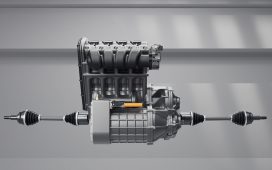The UK’s first pyrolysis plant for recycling end-of-life tyres is being planned, using patented technology designed to extract reusable constituents of scrap tyres.
Pyrolysis is the process of using extreme heat without oxygen to break down organic compounds. In the case of the new plant being commissioned by SUEZ Recycling and Recovery UK, technology from German firm Pyrum Innovations AG will be used to separate tyres into their component raw materials – oil, carbon black, and pyrolysis gas.
According to SUEZ. the carbon black is re-used in the manufacturing of new tyres, the oil is recycled into new products and the Pyrolysis gas is fed back into powering the plant.
“Pyrum’s patented pyrolysis reactor technology will result in the recovery of high-quality raw materials from tyres, saving up to 72 per cent of CO2 emissions in the process, when compared with current recycling methods,” the UK firm says.
An astonishing 50 million tyres are worn out and scrapped in the UK annually, with around 13.4 million being used as alternative fuel, according to SUEZ. UK trade body the Tyre Recovery Association reckons 36,000 tyres are burned daily in the UK.
Often chopped up into particles, the tyres are a more energy-rich alternative to coal-firing for cement kilns and other industrial processes. Other waste tyres in the UK are shredded and ground into crumb for use on playgrounds or sports pitches, and increasingly in road construction. An EU directive has banned dumping used tyres at landfill sites since the ‘noughties’.
The new pyrolysis plant is some way off, as SUEZ says it will spend the next 12 months looking for a suitable site. And while action is clearly needed to improve the sustainability of tyres used in transport, pyrolysis isn’t universally favoured as a recycling technique due to the process requiring more energy than it generates.
Loughborough University released a study on pyrolysis recycling in 2019, when study leader Dr Andrew Rollinson claimed: “This paper shows that self-sustaining pyrolysis, creating energy from waste, is thermodynamically unproven, practically implausible, and environmentally unsound.
The other option, incineration, which is more efficient, has become more expensive because of fighting planning and permit applications due to the negative public perception of burning waste. “The result is we are putting more CO2 into the atmosphere by recycling waste via pyrolysis than if we simply burnt it.”
How much is your car worth? Find out with our free valuation tool…









